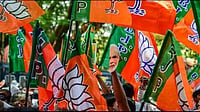On March 28, 2022, when Mohammad Ayub Mattoo, 63, filed a petition in the Supreme Court challenging Jammu and Kashmir delimitation commission, he was with the Congress party and believed in the ideals of the party.
However, on Friday, April 13, when Supreme Court admitted the petition, Mattoo had moved out of the Congress party and is now with Aam Aadmi Party. As his fellow petitioner, Abdul Gani Khan continues with Congress and says Congress can own the petition, while Mattoo says the AAP can take credit for it.
The three-member J&K Delimitation Commission led by former Supreme Court judge, Justice Ranjana Prakash Desai, submitted the final draft report early in May, drawing the new boundaries, names and number of Assembly constituencies in Jammu and Kashmir. The Commission has paved the way for the first-ever Assembly elections in J&K after the abrogation of Article 370. The final report of the Commission would be tabled in the parliament.
After the petition was filed by Mattoo and Khan, the apex court directed the Centre to file its affidavit in six weeks and gave the petitioners two weeks to submit their rejoinder. The Election Commission of India has also been asked to respond to the petition. The case was posted for August 30.
The question now is, whose petition it is? “When I filed the petition, I was with Congress, and it was the Congress party’s petition that time. The apex court has admitted it but now I am with Aam Aadmi Party. So, AAP can take credit for the petition. It is a positive petition. It is about people’s rights and AAP should own it,” says Mattoo.
But Khan, who is with the Congress party, has a different view. “I am with Congress and the party has every right to own it. We are thankful to the Supreme Court for hearing the petition and passing the orders,” he says. While Khan is an actor turned politician and has remained with Congress for a long time, Mattoo has a different political trajectory.
Mattoo says he was making a decent living in Saudi Arabia before joining politics. “I was working there as a dental surgeon. In 2013, former Chief Minister Mufti Mohammad Sayeed called me and urged me to join his party. Mufti was impressed with my NGO related work.” Mattoo says he resigned from his job in Saudi Arabia and returned to the Valley and started working for the PDP. But the PDP, he says, didn’t give him a mandate. Mattoo still continued to work for the party though his heart was not in it.
In 2017, three years after the PDP-BJP alliance, Mattoo got dejected with the PDP and decided to join Congress. He says the Congress state president GA Mir showed full trust in him and made him in charge of the Kulgam constituency where Mattoo is originally from. In time, Mattoo got depressed with the state of affairs in Congress, but at the same time, he says, he had been discussing vital political issues with Congress leaders. He even talked with the party leaders about his petition against the delimitation commission. Mattoo says Congress leaders including Mir and its central command were in favour of filing a petition against the delimitation commission in the apex court.
Both Mattoo and Khan say they filed petitions as realised the delimitation in J&K should take place in 2026 like other parts of the country. They say he and his colleague Abdul Gani Khan have been observing for the past two years that some “big leaders” with mainstream political parties might file petitions against the delimitation commission. They say they did not see any mainstream political leader daring to file the petition, so they decide to take the challenge.
In their petition, they questioned why J&K has been “singled out” for delimitation when Article 170 of the Constitution says such an exercise for the entire country was due only in the year 2026. The petition argues that the Centre had usurped the jurisdiction of the Election Commission by notifying the delimitation of Jammu and Kashmir.


























